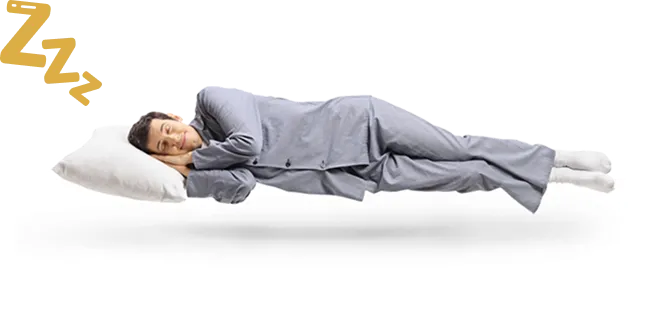Mattress Science
April 2023Sleep Stages Explained: Are you getting enough sleep?
When it comes to sleep, it’s important that we get both enough of it and the right quality of sleep. But did you know when we sleep, it’s not as simple as being awake or asleep? There are different stages and qualities of sleep. Let’s take a further look at what requirements you need for a good night’s sleep. Then you can better prepare yourself and your bedroom for a greater, more consistent night’s sleep.
- How much sleep do you need?
- Does age effect sleep quality?
- Stages of sleep explained
- What is REM sleep?
- Five Tips to sleep better
How much sleep do I actually need?
The amount of sleep an individual needs can vary depending on several factors, including age, lifestyle, and overall health. However, in general, most adults need between 7-9 hours of sleep per night to function at their best.
Infants, children, and teenagers require more sleep than adults, with recommended sleep durations ranging from 12-16 hours per day for infants and up to 9-10 hours per night for teenagers.
It’s important to note that while 7-9 hours is a general guideline for most adults, some individuals may require more or less sleep to feel rested and refreshed.

For example, individuals who engage in high levels of physical activity or have a physically demanding job may require more sleep, while individuals with certain medical conditions or sleep disorders may require less sleep. Everyones sleep needs are subject to individual preferences. People with highly stressful lives, jobs or family lives will need more sleep than someone who is retired or relaxing on a holiday. Additionally, the quality of sleep is just as important as the quantity of sleep.
Getting enough deep, restful sleep is essential for overall health and well-being, and can have a significant impact on mood, cognitive function, and physical performance.
How does age affect sleep?
Age can have a significant impact on sleep, with many older adults experiencing changes in their sleep patterns and overall sleep quality. The older we get, the more night time niggles and issues we may experience. I.e. someone with a bad back is going to have a different mattress and sleep preference than a healthy 20-year-old. As we get older, the need for sleep remains at the same amount of 7-9 hours, but the number of potential sleep drawbacks does increase.

Some common sleep changes that may occur as a person ages include:
1. Difficulty falling asleep
Many older adults may have trouble falling asleep or staying asleep, which can lead to fragmented sleep and daytime fatigue.
2. Changes in sleep architecture
As we age, we tend to spend less time in deep, restorative sleep (known as slow-wave sleep) and more time in lighter, less restful sleep stages.
3. Increased awakenings
Older adults may experience more frequent awakenings during the night, which can disrupt sleep and lead to daytime sleepiness.
4. Decreased total sleep time
While sleep needs to remain relatively constant throughout adulthood, many older adults may find that they naturally sleep for shorter periods of time.
5. Changes in circadian rhythms
As we age, our circadian rhythms (the body’s internal clock that regulates sleep-wake cycles) may become less synchronized, leading to changes in sleep patterns and difficulty falling asleep or waking up at the desired times.

The stages of sleep explained
There are two main types of sleep: non-rapid eye movement (NREM) sleep and rapid eye movement (REM) sleep. Non-rapid eye movement sleep happens in the first 3 stages, known as the ‘N’ stages. Then REM occurs once you have successfully slept through these first three stages.
NREM sleep is divided into three stages:
- N1 (Lightest sleep)
- N2 (Deeper sleep)
- N3 (Slow-wave sleep)
REM sleep is the fourth stage of sleep which occurs after passing through the first stages N1-N3.
Stage 1 (N1)
Stage 1 sleep is the lightest stage of sleep, and it typically lasts for only a few minutes. During this stage, you may experience a feeling of drifting in and out of consciousness. This stage is characterized by a slowing of brain activity, and it is easy to wake up from this stage of sleep.
During stage 1 sleep, your brain produces alpha and theta waves, which are slower and more synchronized than the beta waves produced when you are awake.
Stage 2 (N2)
Stage 2 sleep is a deeper stage of sleep that lasts for approximately 20 minutes in the first cycle of sleep. During this stage, your brain produces sleep spindles, which are bursts of brain activity, and K-complexes, which are sudden increases in brain activity that occur in response to stimuli.
This stage is still considered light sleep, but it is harder to wake up from this stage than it is from stage 1.
Stage 3 (N3)
Stage 3 sleep is the deepest stage of sleep and is also known as slow-wave sleep (SWS). During this stage, your brain produces delta waves, which are even slower than the waves produced in the earlier stages of sleep. This stage typically lasts for around 30 minutes in the first cycle of sleep.
It is during this stage that your body repairs and regenerates tissues, strengthens the immune system, and restores energy. It is also during this stage that growth hormones are released.
REM Sleep
REM sleep is the fourth and final stage of sleep and is characterized by rapid eye movements, hence the name. During this stage, your brain becomes very active, and your heart rate and breathing become irregular.
It is during this stage that you have vivid dreams, and your body becomes temporarily paralyzed.
REM sleep typically occurs about 90 minutes after you fall asleep and lasts for approximately 10-20 minutes in the first cycle of sleep.
As the night progresses, REM sleep periods become longer and more frequent, with the final REM period lasting up to an hour.
The first 3 stages of sleep are preparing your mind and body for a much deeper rest
Once you’ve passed through these 3 stages REM (Rapid eye movement) deep transformative sleep occurs


The Importance of Sleep Stages
Each stage of sleep serves a different purpose, and it is essential to go through all the stages to get a good night’s rest.
During stage 1 and 2, your body temperature drops, and your muscles relax. This allows your body to conserve energy and lower the risk of injury.
During stage 3, your body repairs and regenerates tissues, strengthens the immune system, and restores energy. It is also during this stage that growth hormones are released, which are essential for physical development, tissue repair, and immune function.
Benefits of REM Sleep
REM sleep has several important benefits, including memory consolidation, emotional regulation, and cognitive restoration. REM basically organises the days thoughts, relaxes the mind and restores your mental processes.
Consolidation of memories during REM
During REM sleep, the brain is highly active, and this activity has been linked to the processing and consolidation of memories, particularly those related to emotional events. REM sleep is also important for mood regulation and the restoration of cognitive function, and a lack of REM sleep has been associated with a range of health problems, including depression and cognitive impairment. Overall, REM sleep plays a crucial role in maintaining mental and emotional health.
Aiding Creativity & Problem Solving
Additionally, REM sleep is also believed to be important for creativity and problem-solving. Some studies have suggested that REM sleep may facilitate the integration of information from different parts of the brain, which can lead to new insights and solutions to complex problems. In fact, some artists and writers have reported using their dreams and REM sleep experiences as inspiration for their work.

Regulating the body’s immune system
Another benefit of REM sleep is that it may help regulate the body’s immune system. Some research has shown that people who experience more REM sleep may have stronger immune function and a lower risk of developing certain diseases. This may be due in part to the fact that REM sleep is associated with increased production of certain cytokines, which are proteins that help regulate the immune system.
Overall, REM sleep is a critical stage of the sleep cycle that plays a vital role in maintaining physical, emotional, and cognitive health. While it is important to get enough sleep overall, it is also important to ensure that you are getting enough REM sleep each night to reap the benefits that it provides.
Five Tips to Sleep Better
If you find yourself struggling to sleep, then the next 5 tips should help you in redressing the balance between a good and bad nights sleep. These are our tried and tested tips to sleep better and help get into that valuable REM cycle during the night.
1. Switch off your mobile devices before bedtime
An hour before bed, try and either switch off your mobile devices or set them to night mode. It’s also worthwhile investing in an alarm clock rather than your phone. The constant distraction and light levels on the phone can interfere with your sleep rhythms and leave you agitated before trying to get to sleep.

2. Reduce your caffeine intake
Consider switching that coffee or sugary drink after 4 pm to a herbal tea or decaf variety. Caffeine keeps you awake by blocking adenosine receptors in the brain that promote sleep. Adenosine is a natural brain chemical that is associated with sleep. When caffeine is consumed, it is quickly absorbed and distributed throughout the body, including the brain, where it blocks the action of adenosine by binding to its receptors. This results in increased alertness and wakefulness
3. Take a bath or hot shower
Did you know that hot baths and showers can help you sleep? Hot baths before bed can trigger a cascade of physiological responses in your body, including a decrease in heart rate, blood pressure, and stress hormones like cortisol. This overall relaxation can lead to a feeling of drowsiness, which may make you feel sleepy. As your body begins to cool down. This cooling process can signal to your body that it’s time to rest, as a drop in body temperature is associated with sleep onset. Your body’s natural circadian rhythm regulates sleep-wake cycles and responds to changes in body temperature, and a cooler body temperature can promote sleepiness.
4. Choose better bedding
Bedding and comforters in bed can make all the difference to your sleep stages and patterns. Natural fibre bedding is far more breathable than man-made fibres like polyester. Choosing cotton or a natural fibre blend can make falling asleep far easier and can help you stay comfortable during the night.
Likewise, ensuring that your bedding is clean and fresh aids in a better night’s sleep. It’s always worthwhile washing your bedding weekly on a 60-degree wash to remove bacteria, stains and spillages. This also helps create an inviting space for your to fall asleep rather than disturbing you with stale bedsheets that retain heat.

5. Pick a suitable mattress
Last but not least is checking whether your mattress is genuinely suitable for you. If you have a mattress that’s 7 years or older is maybe time for a change. When speaking to thousands of customers, they all have one problem when it comes to sleep in common. An uncomfortable mattress keeps them awake or wakes them up.
Aim to pick a mattress that has a spring tension suitable for your body weight. Choose mattress comfort layers that contain natural fibres and give the tension you prefer based on your sleeping position. For example, side sleepers need a softer mattress comfort layer than back or front sleepers. Is turnable, so you can use both sides, as this helps reduce settlement and makes the mattress last far longer.
Summary
Ensuring you get a good night’s sleep is paramount to a healthy, productive lifestyle. If you find yourself waking up uncomfortable, groggy or struggling to focus, you may be missing out on the important REM stage of sleep. By checking you have a solid and healthy bedtime routine, you can help ensure that you fall asleep faster and then reach the golden REM stage of sleep. Part of that routine is ensuring your bed, mattress and sleep routine are all conducive to a good night’s sleep.
If you need further help in shortlisting suitable new mattresses, give our small expert team a call for free advice on 0161 437 4419.

Dreaming of the perfect nights sleep?

Ask us a question
There are over 6000 questions and answers submitted by you on all questions about mattresses and bed problems. Enter a keyword such as Vi Spring, John Lewis beds, bad back or Memory Foam and see if your question has already been answered.
If you can’t find an answer in knowledge hub, ask a new question. We aim to respond to all questions within one working day.
Newsletter
Enter your email to join our newsletter. We’ll send you occasional news and mattress expertise.

